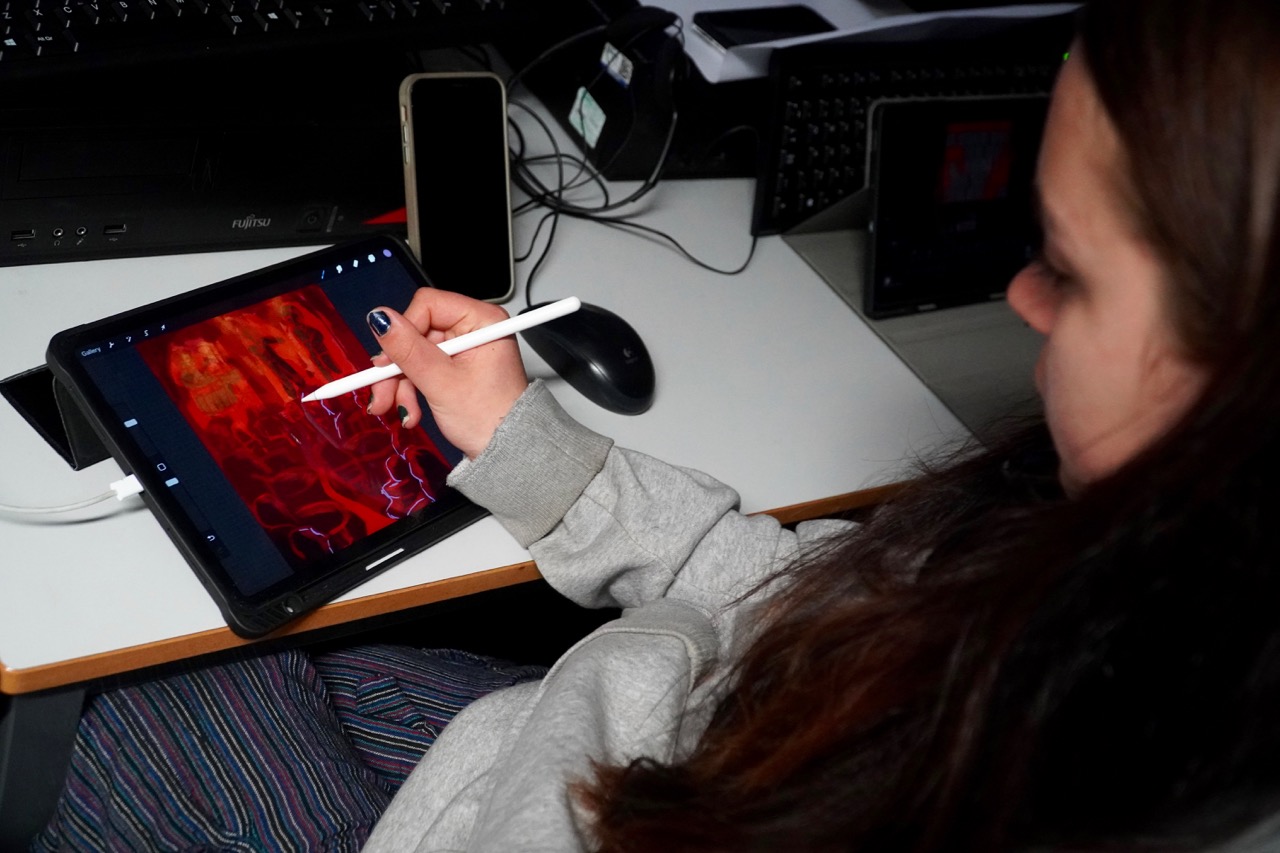Our Specialisms
The creative and digital industries are transformative by nature – creativity and advances in technology, when applied together, have been responsible for heralding every change in the way humans work, ever. But recent history, with the invention of the internet and platforms to connect people across the world to information and each other, is heralding a new age for these industries and shaping the way we live, work and engage with the world around us at an unprecedented rate.
Automation and AI will replace much of the workforce in the coming decades – all except those responsible for the ideas and programming around them, of course. In fact, the creative and digital industry jobs are perhaps the most protected from automation. Today, the most valuable companies on the planet are businesses in new industries made possible by creative minds and new digital technologies – Amazon, Apple and Google.


The UK’s creative industries export £46bn in goods and services across the world from sectors including advertising, film and TV, architecture, publishing, music, design, games, museums and galleries, fashion, crafts, and software and hardware development. According to the Creative Industries Federation, in 2022, the creative industries' economic contribution reached £124.6 billion, reflecting a 6.8% increase from the previous year. This growth rate was more than double that of the UK economy as a whole, underscoring the sector's role as one of the fastest-growing in the country.
These industries are diverse in the types of businesses within them – freelancers and micro-businesses, start-ups and SMEs and organisations like the BBC all contribute to it. Co-working and maker spaces across the country are opening rapidly to satisfy the needs of a growing range of businesses taking part. There has never been a better time to join in.
What is the Creative Sector?
The creative sector, also known as the creative industries, encompasses a wide range of activities and enterprises that involve the generation and commercialisation of creative intellectual property. This sector is characterised by its reliance on individual creativity, skill, and talent, and it plays a significant role in cultural and economic development.
Key components of the creative sector:
- Advertising and Marketing: Includes agencies and individuals who create advertising campaigns, market research, and brand strategies.
- Architecture: Encompasses the design and construction of buildings and spaces, blending functionality with aesthetic appeal.
- Arts and Crafts: Involves the creation of visual arts, crafts, and handmade goods, often reflecting cultural heritage and personal expression.
- Design: Covers graphic design, product design, interior design, fashion design, and more, focusing on aesthetics and functionality.
- Film, TV, and Video: Includes the production of movies, television shows, documentaries, and online video content.
- Music and Performing Arts: Encompasses the creation, performance, and recording of music, theatre, dance, and other live performances.
- Publishing: Covers books, magazines, newspapers, and digital publications, focusing on content creation and distribution.
- Software and Interactive Media: Involves the development of software, video games, apps, and other digital interactive experiences.
- Museums, Galleries, and Libraries: Institutions that preserve, curate, and present cultural, artistic, and educational materials.
- Heritage and Cultural Activities: Activities that promote and preserve cultural heritage, including festivals, cultural tours, and historical preservation projects.
The Creative Sector in the UK
- The creative industries in the UK are a significant economic contributor, generating £124.6 billion in 2022, accounting for 5.7% of the UK's total Gross Value Added (GVA).
- This sector has shown robust growth, expanding by 6.8% in 2022 alone, outpacing the overall growth of the UK economy.
- According to data from 2023, the IT, software, and computer services subsector was the largest contributor, adding approximately £49 billion to the economy. Parliament Research Briefings.
- Film, TV, video, radio, and photography: This group contributed around £21 billion to the UK economy in 2023.
-
Publishing: This sector added approximately £11 billion to the economy in 2023.
The Creative Sector in Liverpool
- Liverpool's creative sector is a vital component of the city's economy. It generates jobs, income, and enhances the city's cultural and social fabric. It contributes significantly to both employment and cultural vibrancy.
- The sector includes media, publishing, ICT, architecture, design, and performing arts and records show that around 24,000 people were employed in the creative sector in the Liverpool city region prior to the COVID-19 pandemic.
- The Liverpool City Region Combined Authority supports the sector with initiatives like the Cultural Compact Action Plan. The 1% For Culture pledge allocates 1% of the authority's annual budget to cultural activities.
- Funding from Arts Council England supports creative projects and collaborations.
What is the Digital Sector?
The digital sector encompasses industries that rely heavily on digital technology and the internet to operate and deliver their products or services. It includes a broad range of activities such as software development, digital marketing, cybersecurity, telecommunications, digital content creation, and e-commerce.
Key components of the digital sector:
- Software Development: Creation of applications, systems, and platforms that facilitate digital interactions and operations.
- Digital Marketing: Use of online platforms and digital technologies to market products and services.
- Cybersecurity: Protecting networks, systems, and data from digital attacks.
- Telecommunications: Services that enable communication through digital means, including mobile networks and internet services.
- Digital Content Creation: Production of content such as videos, music, games, and written content for digital platforms.
- E-commerce: Buying and selling goods and services over the internet.
- Programmers: Write the code that brings the game to life, implementing gameplay mechanics, AI, physics, and more.
- Artists and Animators: Create visual assets, including characters, environments, and animations.
- Sound Designers and Composers: Develop the audio aspects of the game, including sound effects, music, and voice acting.
The Digital Sector in the UK
The digital sector in the UK is a significant driver of the national economy. In 2023, the sector contributed approximately £151 billion to the economy, representing around 9% of the national workforce. This makes the UK one of the most advanced digital economies in Europe, attracting substantial investment and hosting numerous startups and global tech companies (Tech Monitor).
Moreover, the UK's digital strategy aims to further boost this sector's contribution by an additional £41.5 billion by 2025 and create 678,000 new jobs (Tech Monitor). This growth underscores the sector's importance not only in economic terms but also in fostering innovation and technological advancements across various industries.
The Digital Sector in Liverpool
The digital sector in Liverpool is a dynamic and crucial component of the city's economy, encompassing a range of activities from software development to advanced technologies like AI and VR. The sector has seen significant investments and growth initiatives to support its expansion.
- The digital sector in Liverpool is a major contributor to the local economy, fostering innovation and generating employment. The city's focus on digital and tech industries helps drive economic growth and attracts investments.
- The city region promotes skills development through collaborations with local educational institutions and training programs aimed at equipping the workforce with the necessary skills for the digital economy (Growth Platform).
- Liverpool provides robust support for digital businesses through initiatives like LCR Tech Climbers, which showcases the fastest-growing tech businesses, and Gather LCR, which connects the digital community for growth and collaboration (Growth Platform).
- Areas like the Baltic Triangle and Knowledge Quarter are central to the digital and creative scene in Liverpool, housing numerous tech companies and startups (Growth Platform).
What is Engineering?
Engineering is a discipline focused on problem-solving. Engineers design, assemble, and manage the built environment and infrastructure, communication devices, and manufacturing processes for medicines.
Engineers work on diverse projects such as advanced prosthetics, new materials, engine efficiency, alternative fuels, bridge construction, and clean water systems. Using maths and science, they achieve extraordinary feats and tackle some of the world's most complex challenges, from satellites to cell membranes.
The Engineering and Advanced Manufacturing Sector
Liverpool City Region boasts a diverse array of manufacturing companies, both large and small, that have achieved national and global success. It's no surprise that industry giants like Jaguar Land Rover, Unilever, Pilkington, and Astra Zeneca have established their presence here, bringing employment opportunities and world-class expertise.
- The sector combines traditional industries with modern manufacturing, featuring industrial digital technology companies alongside clean growth businesses.
- With a modern manufacturing workforce of 50,000, the skill base in our region is enhanced by the long-term presence of major OEMs, world-leading universities, and an agile, Industry 4.0-enabled supply chain.
- The number of engineering jobs will grow in all UK regions between now and 2030
- 25% of all job postings in the UK are for engineering roles
- There is an increase in ‘green’ engineering jobs and the trend is likely to continue. In the past 5 years postings for ‘green’ engineering jobs have increased by 55% and postings requiring ‘green skills’ by 48%
Skills the future workforce will require include:
- Computer Aided Design
- User Experience
- 3D Modelling
Read a monthly round up of the latest news from the local sector here.

